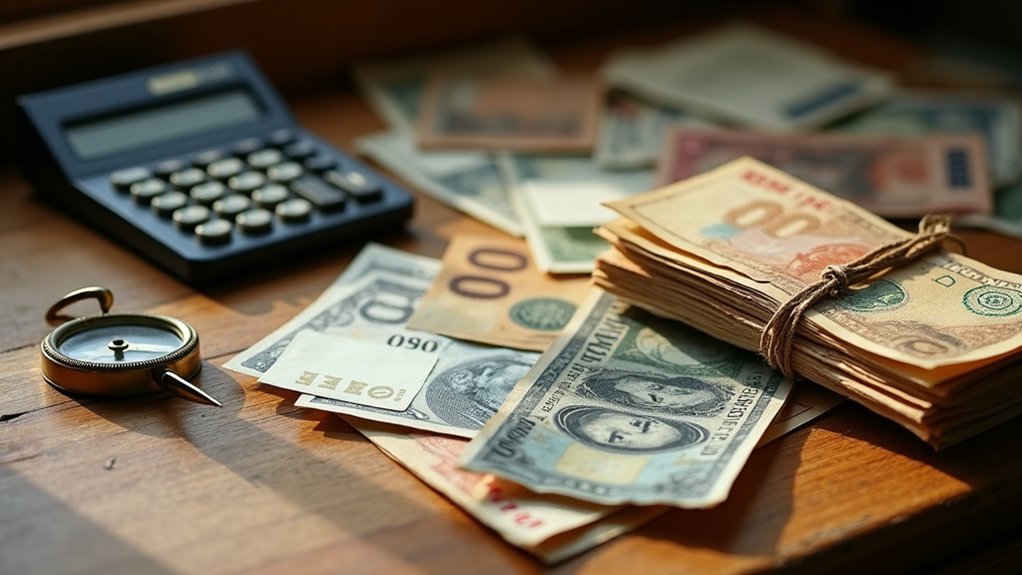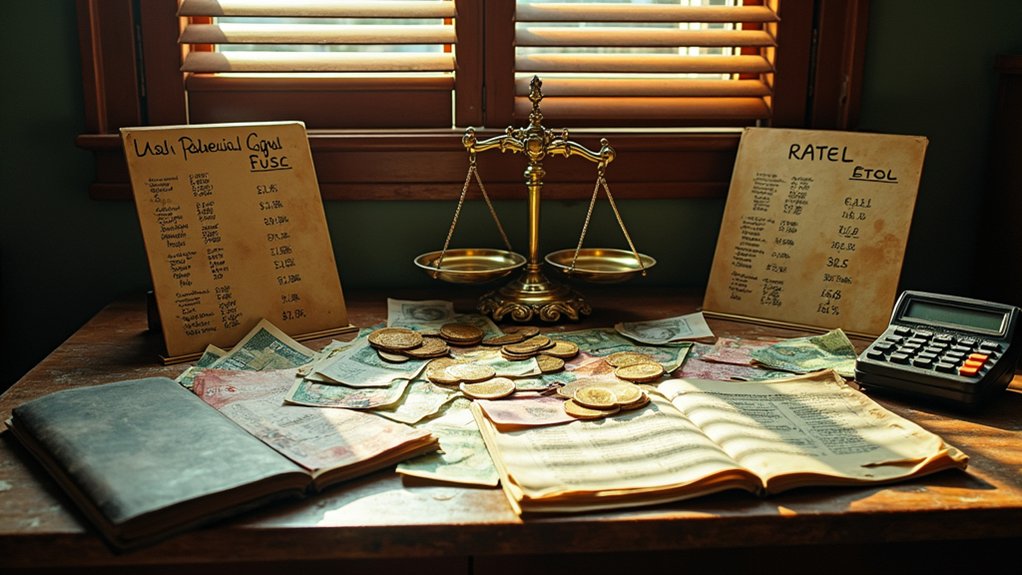Forex trading in Libya isn't illegal—it just isn't regulated, licensed, or protected by any domestic framework, leaving traders in a legal gray zone amid dual exchange rates, a dinar that dropped 13% in April 2025, and a black market so brazen it moved $2.5 billion through fake letters of credit in four months. The Central Bank licenses physical currency bureaux but ignores retail online brokers entirely, prioritizing dinar stability over platform oversight. Navigating this friction requires understanding what rules exist, what protections don't, and where the real risks hide.
Quick Facts That Matter
- Forex trading exists in a legal gray zone with no domestic regulation, licensing, or oversight of retail brokers.
- Dual exchange rates and 13% dinar depreciation create distortions; CBL injected $1 billion to combat black-market rates.
- Nearly $2.5 billion flowed through fraudulent Letters of Credit in 2020, involving state insiders and London correspondent banks.
- Over 80% of firms faced strain from currency restrictions despite 187 licensed exchanges handling $1.6 billion legitimately.
- Prime trading liquidity occurs 14:00–18:00 local time during London–New York overlap; crypto remains banned since 2018.
Overview: Forex Trading in Libya

Libya's forex market operates in a pressure cooker of contradictions. The dinar tanked 13% in April 2025, landing at 5.56 per dollar. Two exchange rates exist simultaneously—official and parallel—creating chaos the IMF politely calls “distortions.” Oil revenues account for 98% of state income, yet the country ran a US$ 6 billion deficit through September.
Forex taxes dropped from 27% to 15%, yet still pulled in 17.7 billion dinars. The Central Bank covered the foreign-exchange shortfall through returns on investments in deposits, bond portfolios, and gold. Central banks in the region employ various intervention mechanisms to stabilize their currencies and manage exchange rate volatility. It's a market built on hydrocarbon volatility, political instability, and creative accounting. Foreign ownership? Severely restricted. Investment climate? Challenging, to put it mildly. Libya's GDP stood at 46.6 billion USD in 2024, measured at purchasers' prices in current dollars.
Is Forex Trading Legal in Libya?

Regulatory chaos meets opportunity in Libya's forex landscape. Forex trading isn't illegal here—there's simply no law about it at all.
The Central Bank of Libya never bothered creating licensing requirements, leaving traders in a legal gray zone. Trade away. Just use offshore brokers regulated somewhere else.
Meanwhile, cryptocurrencies? Banned outright in 2018. No protection, no legality, nothing. Forex gets a pass; Bitcoin doesn't. Strange, right?
Here's the kicker: profits are taxable regardless. The government wants its cut even though it won't regulate the activity itself. Classic bureaucratic contradiction. Trading is permissible. Regulation is absent. Taxes are mandatory.
Without domestic legal frameworks in place, Libyan traders operate in a jurisdiction that offers neither protection nor clear guidelines for foreign exchange activities.
Libyan traders should consider global regulatory oversight when choosing brokers, since local forex regulation remains nonexistent. Look for brokers offering demo accounts to practice strategies without risking real money in this unregulated environment.
Who Regulates Forex Trading in Libya?

Nobody regulates retail forex trading in Libya. The Central Bank of Libya, under Governor Naji Issa, controls currency exchange through 265 licensed bureaux—the first official dealers since 1969. But that's physical currency exchange, not online CFD platforms.
The CBL sets official rates, fights black markets, and warns against unauthorized trading. They care about money laundering and dinar stability. The reform emerged after widespread black-market trading created economic instability across Libya's financial sector. The black-market exchange rate has consistently served as a barometer of government effectiveness since 2011. Like the Bank of Ghana's foreign exchange market interventions, Libya's central bank focuses on stabilizing the national currency rather than regulating retail trading platforms. Retail forex brokers operating through MT4? Different universe entirely. The regulations target traditional exchange offices, not leveraged trading accounts.
How Forex Trading Works in Libya

Without regulation comes chaos, and Libya's forex market delivers exactly that—just not in the way most traders expect.
The Central Bank floods the system with dollars—$1 billion in two days alone—trying to crush black-market rates hovering at 7.81 dinars per dollar.
Meanwhile, 187 licensed exchange offices operate under official supervision, processing transactions through an electronic platform that's handled over $1.6 billion in letters of credit.
Over 1,600 companies register on the CBL's reservation system.
These interventions reflect how central banks shape currency values through direct market operations, though Libya's dual banking system complicates standard monetary policy tools.
It's structured. It's monitored. It's just split between two parallel banking systems in Tripoli and Benghazi, because political division complicates everything.
Best Time to Trade from Libya

Timing matters when your workday runs on Central European Time but the forex market operates on a global clock that never stops.
The forex market doesn't care about your time zone—it runs 24/5 while you're stuck on a 9-to-5 schedule.
Libya sits at GMT+1, which means London opens at 9:00 AM local time—perfect for morning coffee trades.
New York kicks off at 2:00 PM, running until 11:00 PM.
The sweet spot? That London-New York overlap from 2:00 to 6:00 PM delivers peak liquidity and volatility.
Tokyo starts at 1:00 AM for the insomniacs.
Sydney? That's 11:00 PM Sunday evening.
Most Libyan traders stick to European hours because, frankly, sleep exists.
Different currency pairs show distinct activity patterns depending on which markets are open, so matching your trades to the right sessions can significantly improve execution quality.
Payments, Deposits and Withdrawals in Libya
Knowing when to trade matters little if a trader can't actually move money in or out of Libya. MoneyGram operates for inbound remittances, which helps.
Commercial banks offer foreign exchange accounts with cash payment and international transfer capabilities. Currency conversion services exist. The infrastructure is there, sort of.
Libya mandated electronic payments in 2025—Decision No. 135—with point-of-sale terminals expanding 92% and electronic transactions jumping 75% year-over-year. Public sectors must comply by August 1, 2025. Non-compliant businesses face closure. The Central Bank pushes digital infrastructure hard.
Whether forex brokers play nice with all this? Different question entirely. Tanzanian residents face similar constraints when navigating licensed brokers and regulatory frameworks for currency trading.
Taxes, Reporting and Money Rules in Libya
Libya rolled out a regulatory regime in recent years that treats forex trading less like a free-for-all and more like a tightly controlled state operation. The Central Bank now licenses 265–400 currency exchange offices—the first official regulated entities since before Qaddafi took power in 1969.
These bureaux must sell foreign currency at rates no more than 7% above the official CBL rate. Profit ceiling, state-set pricing, the whole package. Inspectors patrol the offices. Break the rules? Expect permanent license revocation.
The government also banned imports outside official banking channels and prohibited re-exporting goods with over 70% foreign content. Traders looking for broker options in similarly regulated African markets often examine how countries like Eswatini balance local oversight with international market access.
Forex Trading Scams and Risks in Libya
Beyond the gray-zone money changers and street-corner hawala dealers, Libya's forex landscape hides industrial-scale fraud that would make most Ponzi schemers blush.
Libya's currency black market conceals systematic corruption that dwarfs ordinary financial crime in both sophistication and audacity.
Between April and July 2020, nearly $2.5 billion flowed through fraudulent Letters of Credit—meat imports quintupled overnight, sugar doubled in price with 100% kickbacks, and a $110 million power generator deal vanished into a UAE shell company.
The money laundered straight through London correspondent banks, thanks to weak UK anti-money laundering rules.
Central Bank officials held directorships in the very banks processing the fraud.
Over 80% of firms choked under currency restrictions while insiders drained state oil dollars.
Quick Q and A
Can Libyan Traders Access International Forex Brokers Despite Local Restrictions?
Available information does not confirm whether Libyan traders can access international forex brokers. Local sources address only domestic regulations and licensed exchanges, leaving cross-border trading permissions, capital controls, and potential sanctions-related restrictions unaddressed and requiring further research.
Which Currency Pairs Are Most Profitable for Traders Based in Libya?
EUR/USD, USD/JPY, and GBP/USD remain most profitable for Libyan traders due to high liquidity and tight spreads. EUR/USD's 2.5% moves and USD/JPY's climb to 153-154 yen offered significant returns in 2025.
Do Libyan Banks Allow Transfers to Offshore Forex Broker Accounts?
Libyan banks technically permit foreign currency transfers abroad, but offshore forex broker transfers face significant regulatory scrutiny. The Central Bank of Libya restricts unauthorized forex operations, requiring all foreign exchange transactions through licensed entities with strict documentation requirements.
Are VPNS Necessary for Libyan Residents to Access Forex Trading Platforms?
No evidence indicates VPNs are necessary for Libyan residents to access forex trading platforms. However, given Libya's infrastructure challenges and occasional internet disruptions, traders may voluntarily use VPNs to guarantee stable, uninterrupted connectivity to international brokers.
What Minimum Deposit Do Most Brokers Require From Libyan Traders?
Most brokers serving Libyan traders require minimum deposits ranging from $5 to $100. Ultra-low options like XM and Exness start at $5, while standard brokers such as AvaTrade (Official Site 🔗) and Tickmill typically require $100 minimum deposits.
The Bottom Line
Trading forex in Libya isn't impossible—just difficult. No local regulation, spotty infrastructure, currency controls that bite, and a banking system that barely functions as one. Traders do it anyway, mostly out of necessity. The risks are real: scams, funding headaches, political chaos. Anyone diving in needs to understand they're operating in a financial gray zone where every transaction involves friction. It's doable. Just don't expect it to be easy.









